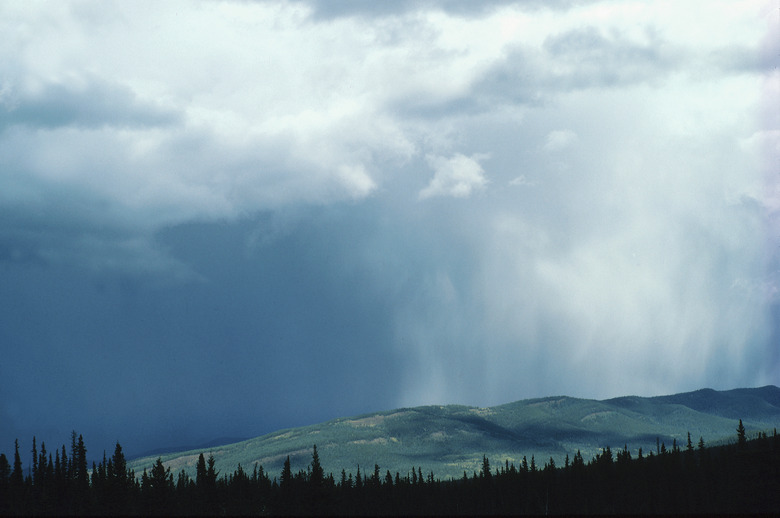What Causes A Rain Shadow?
Mountains and other topographic features can have tremendous influence on precipitation. Rain shadows, or dry regions on the protected side of some mountain ranges, can be some of the driest places on Earth; the Atacama desert in the rain shadow of the Andes Mountains can go decades without receiving any rainfall. A number of factors contribute to the formation of rain shadows, including prevailing winds, topographic features and local weather patterns.
Prevailing Winds
Prevailing Winds
Prevailing winds are predictable winds that occur frequently in particular locations. When a mountain range runs perpendicular to prevailing winds, the winds carry moisture toward these mountains on the side facing the wind. If the winds have an extensive fetch – the distance wind is able to travel over open water – the air will accumulate considerable moisture. Rain results when prevailing winds push this moisture-laden air against topographic features like mountains, forcing it upward.
Orographic Precipitation
Orographic Precipitation
When wind meets mountains, the air rises and cools. The water vapor in the air condenses and rain falls. Orographic precipitation is the rain and snow that result when an air mass collides with a topographic feature. The windward sides of mountain ranges tend to be lush and rich with vegetation because of this rainfall. However, the lee sides of mountain ranges with these weather conditions are in the rain shadow and can be very dry.
Formation of a Rain Shadow
Formation of a Rain Shadow
When orographic precipitation occurs, it depletes this air of moisture. By the time the air passes over the mountains, it is relatively dry. As this dry air moves down the lee side of a mountain range, it warms and becomes capable of retaining even more water vapor. This increases evaporation in these areas as this dry air pulls moisture from the landscape and accelerates as it moves down the mountain. This can cause fierce Foehn winds, such as the the Santa Ana winds in southern California, which are common in rain shadows and can cause dramatic increases in temperature and decreases in humidity. Land in a rain shadow is arid, and cloud cover is scarce.
Regions with Rain Shadows
Regions with Rain Shadows
Rain shadows are common on the western coast of the United States, where mountain ranges run parallel to the coast and perpendicular to the prevailing winds coming off the Pacific Ocean. The Great Basin of Nevada and Utah is in the rain shadow of the Sierra Nevada Mountains. Dry basins can also be found in Washington and Oregon, east of the Cascade Mountains. In Mongolia and China, the Himalaya Mountains create a rain shadow in which the Gobi Desert is located. Rain shadows vary in size depending on wind conditions and topography.
Mountain Ranges, Rain Shadows, and Climate Change
Mountain Ranges, Rain Shadows, and Climate Change
In temperate mountain ranges that build up significant winter snowpacks, and in lower latitude mountains with extensive glacial ice, snowmelt out of the high country provides an important source of moisture within the regional watershed. A major concern associated with our current era of climate change is reduction in snowmelt in the face of warmer temperatures and, in some cases, drier conditions. Warmer winter temperatures may mean more precipitation falls as rain than snow, which means less moisture is captured and held by the mountains to be released slowly during spring melting.
Higher temperatures can mean shrinking (even disappearing) glaciers and a shorter window for snowpack buildup. Less precipitation due to more frequent or extended droughts also negatively impacts mountain snow and ice. Because rain-shadow sides of mountains are even more dependent on snowmelt for annual water supply, given their relatively scanty precipitation, they may be all the more vulnerable to the impacts of climate change.
Cite This Article
MLA
Cairoli, Sarah. "What Causes A Rain Shadow?" sciencing.com, https://www.sciencing.com/causes-rain-shadow-5061/. 30 September 2021.
APA
Cairoli, Sarah. (2021, September 30). What Causes A Rain Shadow?. sciencing.com. Retrieved from https://www.sciencing.com/causes-rain-shadow-5061/
Chicago
Cairoli, Sarah. What Causes A Rain Shadow? last modified March 24, 2022. https://www.sciencing.com/causes-rain-shadow-5061/
